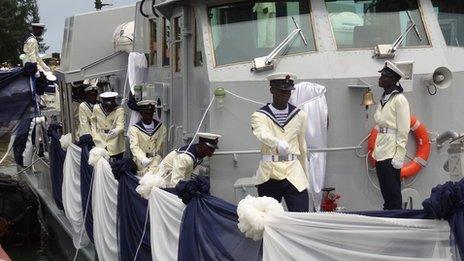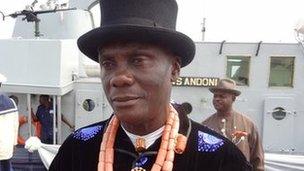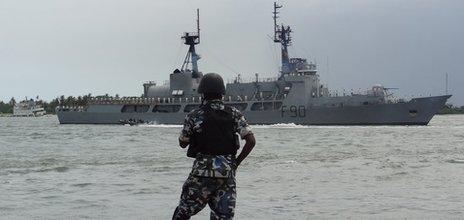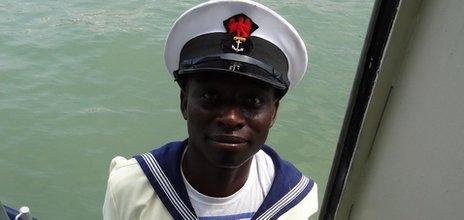Nigeria celebrates first home-made warship
- Published

"Proudly Nigerian" does not just apply to the people of this vast land - the West African giant is now building its own warships.
After nearly five years in the making, the Nigerian navy ship or NNS Andoni was launched with a colourful event.
At 31m (100ft) long, this is no giant of the seas, but the fact that it was designed and built in Nigeria, by Nigerian engineers, is a great source of pride.
"We are all happy and elated," said Commodore SI Alade, one of Nigeria's senior naval officers.
"This is the first time this kind of thing is happening in Nigeria and even in the sub region."
Moments after stepping on board NNS Andoni, sailor FL Badmus said: "I feel on top of the world.
"I'm proud to have been picked by the naval authorities to serve on this ship.
"We hope this is the beginning of very good things to come and we thank God for it."
The warship was named after the Andoni people of south-eastern Nigeria - and several chiefs travelled to Lagos to witness the launch - including his Royal Highness NL Ayuwu Iraron Ede-Obolo II, wearing a top hat, a sequin-adorned velvet gown and a brightly coloured necklace.
The ceremony also featured multi-faith prayers, with an imam asking God to "protect and preserve this ship from the dangers of the day and the violence of the enemy", and a Christian praying: "May she sail with success like the Ark of Noah."
The event had an interesting twist of symbolism for the guest of honour, Nigeria's leader, Goodluck Jonathan.
Anti-pirate ship

Named after the Andoni, their chiefs were some of the guests of honour at the ship's launch
He is from a family of canoe makers - and that he is now the president launching a warship is a sign of how far he has risen.
"This is the beginning of the transformation... and I believe in another 10 to 15 years, we can be thinking about starting a project to take Nigerians into the air," President Jonathan said.
The NNS Andoni could be key in the fight against militants operating near Nigeria's oil fields as well as the growing threat of piracy in the Gulf of Guinea.
Piracy in Nigerian waters is on the increase and incidents are happening over a wider area, according to the International Maritime Bureau.
There were 10 piracy attacks off the 780km (485 miles) of Nigeria's coastline during the first quarter this year - the same number reported for the whole of 2011.
"While the number of reported incidents in Nigeria is still less than Somalia… the level of violence against crew is dangerously high," according to a recent IMB report.
The NNS Andoni is equipped with an advanced radar system and firepower.
"With a speed of up to 25 knots (46km/h), this can quickly go to intercept the pirates," said Commanding Officer Adepegba standing on the bridge pointing out the ship's three machine guns and the automatic grenade launcher.
Foreign orders
The Nigerian navy reportedly wants to acquire 49 more vessels over the next 10 years. But how many will be home built?
Orders are already in - for three from a French shipbuilder, and six from Singapore.

The NNS Thunder was donated by the US - but its monthly fuel bill is huge
President Jonathan recently approved the acquisition of two large patrol vessels from China Shipbuilding and Offshore International, a mainly state-owned company.
In an effort to boost local industry, one of the Chinese vessels is meant to be 70% built in Nigeria.
NNS Andoni was dwarfed when a 105m-long frigate steamed past during the ceremony - with all the officers cheering on deck.
NNS Thunder, a veteran of the Vietnam War, arrived at the beginning of the year, a gift from the US.
Eyebrows were raised when it was announced that the monthly fuel bill of the 45-year-old ship would be $1m (£650,000).
When this year's navy's $450m budget was discussed at the House of Assembly in January, one senator described the donated ships as hand-outs that could become liabilities rather than assets.
There were also calls for corruption to be plugged.
"Corruption has sucked the blood out of our system. So we have to depend on hand-outs," one senator lamented.
NSS Andoni's fuel bill will certainly be lower than NNS Thunder.
'No indigenous touch'
After parading on the deck, the naval officers took photos of each other with mobile phones - clearly delighted with the new ship.
"It's a great day. It's taken over five years but it's worth it," said a smiling Kelechi, one of the engineers.
"We came up with the design, the expertise and about 60% of the materials were locally sourced. The engines, generators and navigation equipment came from outside."
Nigeria is one of Africa's biggest oil producers, but this has not so much helped as hampered the development of local industries because the country has relied so heavily on imported goods.

Sailors hope NNS Andoni will mark a bright new future for Nigeria's navy
As he launched NNS Andoni, President Jonathan lamented the decline of industries that had been strong not long after independence in 1960.
"We had Nigerian Airways, the Nigerian shipping line and a number of investments that were doing well. But because there was no indigenous touch, all these died," the president said.
"We are told that some countries that were on par with us are now building aircraft, choppers and other things," he said, adding that Nigeria had for a long time not embraced technology.
The president suggested sending the brightest students of engineering to the best universities in the world.
"Then let them come back and work in Nigeria because we cannot continue to be importing. We have a very large market and even what we consume alone is enough to support an industry."
"We have this market, we must use it," President Jonathan said - before laying the keel to mark the start of work on the second "Made in Nigeria" warship.